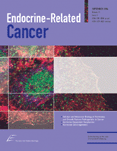| HOME | HELP | FEEDBACK | SUBSCRIPTIONS | ARCHIVE | SEARCH | TABLE OF CONTENTS |
|
|
||||||||
REVIEW |
Department of Urology, Innsbruck Medical University, Anichstrasse 35, A-6020 Innsbruck, Austria
1 Department of Urology, General Hospital Feldkirch, Cariuagasse 45, A-6800 Feldkirch, Austria
(Requests for offprints should be addressed to Z Culig; Email: zoran.culig{at}uibk.ac.at)
Several options for the endocrine treatment of non-organ-confined prostate cancer are available. They include surgical or medical removal of androgenic hormones or administration of non-steroidal anti-androgens. However, tumour progression after a period of remission of the disease inevitably occurs in virtually all patients. The androgen receptor (AR) is, in various tumour models, implicated in the development of therapy resistance but molecular mechanisms that by-pass the receptor have also been described. Adaptation mechanisms relevant to tumour recurrence include up-regulation of AR mRNA and protein, overexpression of AR coactivators, increased activation of mutated receptors by steroids and anti-androgens, and ligand-independent activation. For research studies, sublines that respond to but do not depend on androgen for their proliferation were generated. Coactivators SRC-1, TIF-2, RAC3, p300, CBP, Tip60, and gelsolin are highly expressed in endocrine therapy-resistant prostate cancer. AR point mutations are increasingly detected in relapsed cancers and contribute to the failure of endocrine therapy in a subgroup of patients. Ligand-independent activation of the AR by HER-2/neu and interleukin-6 is associated with activation of the signalling pathway of mitogen-activated protein kinase. Increased activity of intracellular kinases may affect cellular events in both an AR-dependent and -independent manner. Mitogen-activated protein kinases are strongly phosphorylated in endocrine therapy-resistant prostate tumours. Similarly, activation of the AR by phosphorylated protein kinase B, Akt, has also been reported in prostate cancer. Activation of the Akt pathway contributes to increased survival of prostate tumour cells.
This article has been cited by other articles:
 |
C. J. Hoimes and W. K. Kelly Redefining hormone resistance in prostate cancer Therapeutic Advances in Medical Oncology, March 1, 2010; 2(2): 107 - 123. [Abstract] [PDF] |
||||
 |
K. Malinowska, H. Neuwirt, I. T Cavarretta, J. Bektic, H. Steiner, H. Dietrich, P. L Moser, D. Fuchs, A. Hobisch, and Z. Culig Interleukin-6 stimulation of growth of prostate cancer in vitro and in vivo through activation of the androgen receptor Endocr. Relat. Cancer, March 1, 2009; 16(1): 155 - 169. [Abstract] [Full Text] [PDF] |
||||
 |
C. Teyssier, S. Bianco, O. Lanvin, and J.-M. Vanacker The orphan receptor ERR{alpha} interferes with steroid signaling Nucleic Acids Res., September 1, 2008; 36(16): 5350 - 5361. [Abstract] [Full Text] [PDF] |
||||
 |
M. Nakamura, B. Han, T. Nishishita, Y. Bai, and K. Kakudo Calcitonin targets extracellular signal-regulated kinase signaling pathway in human cancers J. Mol. Endocrinol., December 1, 2007; 39(6): 375 - 384. [Abstract] [Full Text] [PDF] |
||||
 |
S. Feng, I. U. Agoulnik, N. V. Bogatcheva, A. A. Kamat, B. Kwabi-Addo, R. Li, G. Ayala, M. M. Ittmann, and A. I. Agoulnik Relaxin Promotes Prostate Cancer Progression Clin. Cancer Res., March 15, 2007; 13(6): 1695 - 1702. [Abstract] [Full Text] [PDF] |
||||
 |
A. G. Papatsoris, M. V. Karamouzis, and A. G. Papavassiliou The power and promise of "rewiring" the mitogen-activated protein kinase network in prostate cancer therapeutics Mol. Cancer Ther., March 1, 2007; 6(3): 811 - 819. [Abstract] [Full Text] [PDF] |
||||
 |
B. Li, A. Sun, H. Youn, Y. Hong, P. F. Terranova, J.B. Thrasher, P. Xu, and D. Spencer Conditional Akt activation promotes androgen-independent progression of prostate cancer Carcinogenesis, March 1, 2007; 28(3): 572 - 583. [Abstract] [Full Text] [PDF] |
||||
 |
J. Merlet, C. Racine, E. Moreau, S. G. Moreno, and R. Habert Male fetal germ cells are targets for androgens that physiologically inhibit their proliferation PNAS, February 27, 2007; 104(9): 3615 - 3620. [Abstract] [Full Text] [PDF] |
||||
 |
Y. B. Wetherill, J. K. Hess-Wilson, C. E.S. Comstock, S. A. Shah, C. R. Buncher, L. Sallans, P. A. Limbach, S. Schwemberger, G. F. Babcock, and K. E. Knudsen Bisphenol A facilitates bypass of androgen ablation therapy in prostate cancer Mol. Cancer Ther., December 1, 2006; 5(12): 3181 - 3190. [Abstract] [Full Text] [PDF] |
||||
 |
L. Peng, P. J. Malloy, J. Wang, and D. Feldman Growth Inhibitory Concentrations of Androgens Up-Regulate Insulin-Like Growth Factor Binding Protein-3 Expression via an Androgen Response Element in LNCaP Human Prostate Cancer Cells Endocrinology, October 1, 2006; 147(10): 4599 - 4607. [Abstract] [Full Text] [PDF] |
||||
 |
L.G. Wang, X.M. Liu, and J.W. Chiao Repression of androgen receptor in prostate cancer cells by phenethyl isothiocyanate Carcinogenesis, October 1, 2006; 27(10): 2124 - 2132. [Abstract] [Full Text] [PDF] |
||||
 |
B. Dai, O. Kim, Y. Xie, Z. Guo, K. Xu, B. Wang, X. Kong, J. Melamed, H. Chen, C. J. Bieberich, et al. Tyrosine Kinase Etk/BMX Is Up-regulated in Human Prostate Cancer and Its Overexpression Induces Prostate Intraepithelial Neoplasia in Mouse Cancer Res., August 15, 2006; 66(16): 8058 - 8064. [Abstract] [Full Text] [PDF] |
||||
 |
S. Zaripheh, T. Y. Nara, M. T. Nakamura, and J. W. Erdman Jr. Dietary Lycopene Downregulates Carotenoid 15,15'-Monooxygenase and PPAR-{gamma} in Selected Rat Tissues J. Nutr., April 1, 2006; 136(4): 932 - 938. [Abstract] [Full Text] [PDF] |
||||
 |
M. Mimeault and S. K. Batra Recent advances on multiple tumorigenic cascades involved in prostatic cancer progression and targeting therapies Carcinogenesis, January 1, 2006; 27(1): 1 - 22. [Abstract] [Full Text] [PDF] |
||||
| HOME | HELP | FEEDBACK | SUBSCRIPTIONS | ARCHIVE | SEARCH | TABLE OF CONTENTS |